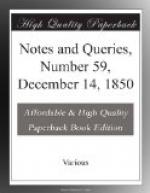1. Gray: In the first edition of the Elegy the epithet in question is droning; and so it stands in the Poems of Gray, as edited by himself, in 1753, 1768, &c.
2. Dodsley: The first edition of the important poetical miscellany which bears his name was published in 1748, in three volumes, 12mo.
BOLTON CORNEY.
* * * * *
MISCELLANEOUS.
NOTES ON BOOKS, SALES, CATALOGUES, ETC.
The New Classical Dictionary of Biography, Mythology, and History, may be considered as the third in that important series of Classical Dictionaries for which the world is indebted to the learning of Dr. Smith. As the present work is distinguished by the same excellencies which have won for the Dictionary of Greek and Roman Antiquities, and the Dictionary of Greek and Roman Biography and Mythology, the widely-spread reputation they enjoy, we shall content ourselves with a few words explanatory of the arrangement of a work which, it requires no great gift of prophecy to foretell, must ere long push Lempriere from its stool. The present Dictionary may be divided into three portions. The Biographical, which includes all the historical names of importance which occur in the Greek and Roman writers, from the earliest times down to the extinction of the Western Empire; those of all Greek and Roman writers, whose works are either extant or known to have exercised an influence upon their respective literatures; and, lastly, those of all the more important artists of antiquity. In the Mythological division may be noticed first, the discrimination, hitherto not sufficiently attended to, between the Greek and Roman mythology, and which in this volume is shown by giving an account of the Greek divinities under their Greek names, and the Roman divinities under their Latin names; and, secondly, what is of still more consequence, the care to avoid as far as possible all indelicate allusions in the respective histories of such divinities. Lastly, in the Geographical portion of the work, and which will probably be found the most important one, very few omissions will be discovered of names occurring in the chief classical writers. This brief sketch of the contents of this New Classical Dictionary will satisfy our readers that Dr. Smith has produced a volume, not only of immense value to those who are entering upon their classical studies, but one which will be found a most useful handbook to the scholar and the more advanced student.
The Greek Church, A Sketch, is the last of the Shilling Series in which Mr. Appleyard has described {486} the different sections of Christendom, with a view to their ultimate reunion. Like its predecessors, the volume is amiable and interesting, but being historical rather than doctrinal, is scarcely calculated to give the uninformed reader a very precise view of the creed of the Greek Church. It may serve, however, to assure us that the acrimony of religious discussion and the mutual jealousy of Church and State, which disquiets so many minds at present, was more than matched in the days of Constantine and Athanasius.




